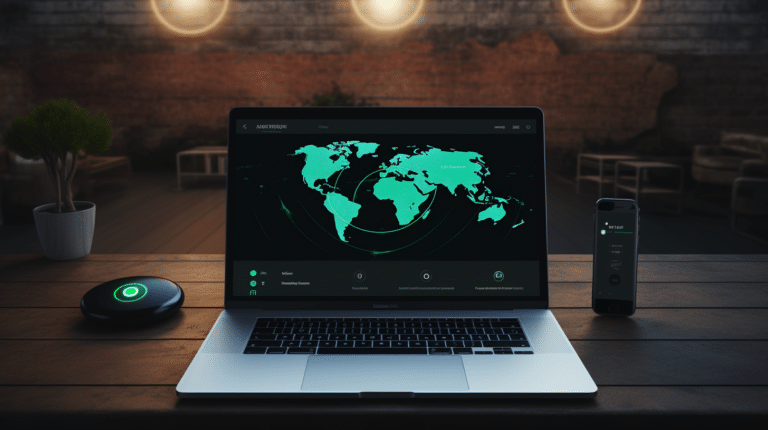Torrenting, or peer-to-peer (P2P) file sharing, allows users to download and distribute files, such as movies, music, and software, via an extensive network connection. While torrenting can be legal and convenient for obtaining various types of content, it can also expose users to potential risks, such as copyright infringement penalties, malware, hacking, and surveillance. This is where utilizing a Virtual Private Network (VPN) can be particularly beneficial in protecting your privacy and security during torrenting activities.
VPNs serve as a secure and encrypted tunnel between your device and the internet, effectively concealing your online activities, IP address, and location. When combined with torrenting, a reliable VPN can significantly minimize the risks associated with P2P file sharing by ensuring your anonymity and maintaining optimal download speeds. However, not all VPN services support torrenting or maintain the necessary features for safe and efficient P2P file sharing. Therefore, it is essential to choose the right VPN specifically designed for torrenting to reap its benefits.
Key Takeaways
- Using a VPN for torrenting enhances privacy and security by encrypting data and hiding your IP address.
- Selecting a VPN with torrenting-friendly features like a no-logs policy, kill switch, and fast server speeds is crucial for a seamless torrenting experience.
- It is important to consider additional factors, such as antivirus software and the choice of torrent clients, to further protect yourself during P2P file sharing activities.
Understanding Torrenting and VPN
What is Torrenting?
Torrenting is a popular method for sharing files over the internet through a peer-to-peer (P2P) network. It uses the BitTorrent protocol, which breaks down large files into smaller pieces and distributes them across multiple users’ computers. As each user downloads a portion of the file, they simultaneously upload those parts to other users in the network, making the download process faster and more efficient.
However, torrenting has a reputation for being associated with copyright infringement due to the ease with which copyrighted materials can be illegally distributed. Additionally, when you’re torrenting, your IP address is visible to other users in the network, which may expose your identity and put your privacy at risk.
What is a VPN?
A VPN (Virtual Private Network) is a service that offers an extra layer of security and privacy to your internet connection. It works by encrypting your data and routing it through a remote server, which masks your real IP address and location. With a VPN, your online activities are hidden from your Internet Service Provider (ISP) and any potential snoopers, making it harder for anyone to trace your activities or access your personal information.
Using a VPN when torrenting adds a layer of protection to your online activities by concealing your IP address from other users in the P2P network. This helps prevent possible legal repercussions and protect your privacy. Furthermore, a quality VPN specifically designed for torrenting will have P2P servers that are optimized for high-speed file sharing.
To ensure you’re protected while torrenting, choose a reputable VPN service with a no-logs policy, P2P server support, and strong encryption. A reliable VPN will guard your privacy, minimize the risk of copyright-related issues, and offer a seamless torrenting experience.
Why Use a VPN for Torrenting
There are several reasons to use a VPN for torrenting. In this section, we will discuss some of the main motivations: Privacy Protection, Overcoming Geographical Limitations, and Bypassing Throttling.
Privacy Protection
A VPN for torrenting is essential to ensure your privacy while downloading or sharing files. Torrenting exposes your IP address to other users in the swarm, making it easy for anyone to trace your online activities. By hiding your IP address, a VPN masks your identity and secures your data from prying eyes, such as hackers, copyright trolls, and even your ISP.
In addition, some VPNs offer features like a kill switch that automatically disconnects you from the internet if the VPN connection drops, ensuring your privacy remains protected at all times.
Overcoming Geographical Limitations
Some torrent files might be unavailable or restricted in specific regions, preventing you from accessing them. This could be due to internet censorship imposed by the government or restrictions set by the content owner.
A VPN for torrenting can help you bypass these geographical limitations by connecting to a server in another country. This way, you can access torrent files that would otherwise be inaccessible from your region.
Bypassing Throttling
ISPs sometimes throttle internet speeds when they detect data-heavy activities like torrenting. They do this to manage network congestion and discourage users from consuming too much bandwidth. Throttling manifests as reduced download and upload speeds, ultimately affecting your torrenting experience.
Using a VPN can help you bypass ISP throttling since it encrypts your data and masks your online activities. Your ISP will no longer be able to distinguish between regular browsing and torrenting traffic, ensuring your internet speed remains stable throughout the process.
In conclusion, a VPN for torrenting is vital for ensuring privacy protection, overcoming geographical limitations, and bypassing throttling. Remember to choose a reliable VPN with solid security features to maximize these benefits.
Key Features of VPNs for Torrenting
When choosing a VPN for torrenting, it’s essential to consider several key features to ensure a safe and secure experience. In this section, we will discuss four crucial aspects: encryption, protocols, kill switch, and split tunneling.
Encryption
Encryption is a critical component of a VPN’s ability to protect your data. A robust VPN should utilize strong encryption methods, such as AES 256-bit, to secure your data as it passes through the VPN tunnel. This level of encryption renders your torrenting activities virtually unreadable to prying eyes, ensuring your privacy and security.
Protocols
VPNs employ various protocols to establish a secure connection between your device and the VPN server. Some popular protocols include OpenVPN, WireGuard, and IKEv2. Different protocols offer varying levels of security and speed. For torrenting, it’s recommended to use a protocol known for its security, such as OpenVPN or WireGuard, to ensure a balance between speed and privacy.
Kill Switch
A kill switch is a crucial VPN feature that automatically disconnects your internet connection if the VPN connection drops, preventing accidental exposure of your torrenting activity. By enabling the kill switch, you can ensure that your true IP address and torrenting activities remain hidden, even if your VPN connection becomes temporarily unstable.
Split Tunneling
Split tunneling is a feature that allows you to choose which traffic is routed through the VPN and which traffic uses your regular internet connection. This is particularly useful for torrenting, as it enables you to protect your torrenting activity while still accessing local content or maintaining regular internet speed for non-torrenting tasks. By selectively routing your torrenting traffic through the VPN, you can balance security and speed, ensuring an optimized torrenting experience.
Best VPNs for Torrenting
When it comes to torrenting safely and efficiently, using a reliable VPN is essential. Here, we’ll discuss the top five VPNs for torrenting in 2023: ExpressVPN, NordVPN, CyberGhost, Surfshark, and Proton VPN.
ExpressVPN
ExpressVPN stands out as one of the best VPNs for torrenting. Known for its fast speeds, strong security features, and user-friendly interface, it is an ideal choice for users who prioritize both performance and privacy. The VPN offers unlimited bandwidth, which is crucial for uninterrupted torrenting and streaming. Moreover, their no-logs policy ensures that your browsing and torrenting activities remain anonymous.
NordVPN
Another top contender is NordVPN, a well-rounded service that boasts an extensive server network, excellent security, and a user-friendly interface. With their specialized P2P servers, NordVPN ensures that your torrenting experience is both fast and secure. The provider also offers features such as Double VPN and a Kill Switch, providing an extra layer of protection for your torrenting activities.
CyberGhost
CyberGhost is a solid choice for users seeking a balance between affordability and performance. This VPN stands out with its dedicated torrenting profile that connects you to the best servers for fast and secure torrenting. In addition, CyberGhost has a strict no-logs policy and features IP and DNS leak protection, ensuring a safe torrenting experience.
Surfshark
For those looking for a budget-friendly option without compromising on quality, Surfshark is the way to go. Surfshark offers an impressive set of features, including fast speeds, robust security measures, and a strict no-logs policy, at a highly competitive price point. With dedicated P2P servers and unlimited simultaneous connections, Surfshark presents itself as an excellent choice for torrenting.
Proton VPN
Last but not least, ProtonVPN is a popular choice among privacy-conscious users. Offering a secure and reliable connection, ProtonVPN incorporates essential privacy features such as a no-logs policy and a Kill Switch. Though not as fast as some of the other options on this list, ProtonVPN’s commitment to privacy and P2P support make it a strong contender for torrenting activities.
To sum up, these top five VPNs are all excellent choices for anyone looking to ensure a safe and efficient torrenting experience. Remember to consider your specific needs and preferences when choosing a VPN for torrenting.
Potential Risks and Their Prevention
Malware and Viruses
One major concern when torrenting is the potential to download files containing malware or viruses. These malicious files can potentially harm your device or steal your data. To avoid such risks, it’s essential to use reliable antivirus software and ensure it is up-to-date. Moreover, always double-check the reputation of the torrent source before downloading it.
Legal Ramifications
Illegal torrenting can lead to serious legal consequences. Downloading copyrighted material without permission is against the law in many countries, and you may face fines or even jail time if caught. Using a VPN can help you torrent anonymously, masking your IP address and encrypting your data. However, always remember that a VPN does not give you the license to engage in illegal activities. So, be cautious and ensure that the torrented content is legal and does not infringe any copyrights.
Data Leaks
When torrenting, your IP address is exposed to the public, making you vulnerable to online threats. A VPN can provide you with an encrypted connection and hide your IP address, effectively protecting your privacy. However, occasional data leaks can happen, such as DNS or WebRTC leaks, which can compromise your anonymity. To prevent these leaks, use a VPN that offers advanced security features like a kill switch, DNS leak protection, and WebRTC leak protection.
Remember to consider the VPN’s server location as well. Choosing a server in a country with strong data protection laws can further enhance your privacy and protect your information.
In summary, while torrenting using a VPN can significantly minimize the risks associated with malware, legal ramifications, and data leaks, it’s essential to practice safe torrenting habits and not engage in illegal activities. The combination of a secure VPN with advanced security features and mindful torrenting practices will help you enjoy a safer and more anonymous torrenting experience.
Peer-to-Peer File Sharing
Peer-to-peer (P2P) file sharing is a popular method for sharing large files, including music, movies, and applications, over the internet. In a P2P network, users connect directly to each other without the need for a central server. This decentralized approach distributes the network load, reducing server costs and improving download speeds for participating users. P2P file sharing has gained popularity among internet users, leading to a significant increase in P2P traffic over the years.
P2P file sharing has also raised concerns about copyright infringement. Some users share copyrighted materials without obtaining permission from the copyright holders, leading to legal issues for both sharers and those downloading the content. As a result, internet service providers (ISPs) and governments have taken steps to monitor and restrict P2P traffic, such as slowing down or even blocking certain file-sharing protocols.
To protect their privacy and circumvent these restrictions, many P2P users turn to VPNs (Virtual Private Networks). A VPN allows users to encrypt their internet traffic and route it through a remote server, making it harder for ISPs and other parties to monitor or trace their online activities. When it comes to torrenting, a VPN is particularly helpful in maintaining anonymity and avoiding legal consequences.
However, not all VPNs are suitable for P2P file sharing. Some VPN providers may throttle P2P traffic or have restrictive policies against file-sharing activities. It is essential to choose a VPN with features that support torrenting, such as strong encryption, a no-logs policy, and a large network of servers. Some of the best VPNs for torrenting include ExpressVPN, NordVPN, and CyberGhost.
In conclusion, P2P file sharing is a convenient method for sharing large files over the internet, but it comes with risks associated with copyright infringement and privacy concerns. Using a reliable VPN can mitigate these risks and provide a safer, more private torrenting experience.
Ensuring Anonymity and Speed
Server Selection
To guarantee both anonymity and speed while torrenting with a VPN, it’s essential to choose the right server. Opt for VPN providers that offer dedicated P2P or torrenting servers, as these are tailored to handle torrent traffic. Preferably, select a server close to your physical location to maintain high connection speeds, as this can significantly impact your download speeds.
Aside from proximity, check whether the chosen VPN server supports anonymous connections to torrent sites. Remember, your primary goal is to ensure your privacy and security while accessing torrent sites. Some VPN services, like NordVPN, offer optimized P2P servers for torrenting, providing users with an additional layer of protection.
Seeding and Leeching
Understanding the concepts of seeding and leeching is vital for efficient torrenting. Seeding refers to the process of uploading or sharing files with other users. The more seeders there are, the faster a file can be downloaded. On the other hand, leeching is when users download a torrent file without uploading it back to the network. This practice can lead to slower download speeds for others.
When torrenting with a VPN, it’s crucial to ensure you maintain a healthy ratio of seeding and leeching. By doing so, you contribute to the community and improve overall server speeds. However, remember to stay connected to a VPN server optimized for torrenting to maintain anonymity while seeding.
Balancing Anonymity and Speed
Achieving the right balance between anonymity and speed can be a challenge. A secure and fast VPN will encrypt your data and hide your IP address, ensuring your privacy is not compromised. However, encryption may cause a slight drop in connection speeds.
To minimize speed loss, choose a VPN service with a proven track record of high server speeds and robust security features. This way, you’ll retain your anonymity online while enjoying satisfactory download speeds throughout your torrenting experience.
Choosing Torrent Clients
When it comes to torrenting with a VPN, selecting a suitable torrent client is crucial. There are several popular torrent clients available, each with its unique set of features and considerations. In this section, we’ll discuss four of the most widely used torrent clients: uTorrent, qBittorrent, Vuze, and Deluge.
- uTorrent: is a lightweight and widely-used torrent client known for its ease of use and small system footprint. It offers basic torrenting features like magnet links, bandwidth prioritization, and scheduling. However, it has been criticized for its ad-supported interface and potential privacy concerns. If you’re using a VPN while torrenting, pairing it with a more privacy-conscious client like qBittorrent could be a better fit.
- qBittorrent: is an open-source and ad-free alternative to uTorrent. It provides a clean and user-friendly interface, offering a similar set of features to uTorrent but with added security benefits. Additionally, qBittorrent has a built-in search function, an IP filtering option, and support for proxy servers, which can further enhance your torrenting experience with a VPN.
- Vuze: is another popular torrent client known for its advanced features and user interface. It offers features like media playback, remote control, plugin support, and a built-in torrent search. Vuze is available in two versions: a free version with basic features and a paid version with more advanced options. However, some users may find its interface more complex than other torrent clients, and it can be resource-intensive.
- Deluge: is a lightweight, open-source torrent client focused on providing a simple and efficient user experience. It relies on a plugin-based architecture, allowing users to customize their torrenting experience by adding or removing features as necessary. Deluge is an excellent option for users who want a minimal and straightforward client without unnecessary extras.
While each of these torrent clients has its pros and cons, the key is to choose one that aligns with your needs and works well with your VPN. A combination of a reliable VPN and a suitable torrent client can greatly enhance your torrenting experience, ensuring speed, security, and privacy.
The Role of VPNs in Overcoming Constraints
Virtual Private Networks (VPNs) play a vital role in enhancing the privacy and security of your internet connection, especially when it comes to torrenting. A VPN creates an encrypted tunnel between your device and an external VPN server, ensuring that your data remains secure from prying eyes and your online activities are anonymized.
When using a VPN for torrenting, several factors come into play, including the no-logs policy and no-logging policy. These policies ensure that your VPN provider does not store any data about your online activities, providing an additional layer of privacy. Furthermore, VPNs can help bypass geo-restrictions and improve your overall internet connection by hiding your IP address and avoiding potential throttling by your Internet Service Provider (ISP).
While there are many free VPN options available on the market, it is important to be cautious when selecting a provider. Some free VPNs may not offer the necessary security measures or may have limitations in terms of bandwidth, which could negatively impact your torrenting experience. It is crucial to opt for a reliable VPN provider that maintains a strict no-logs policy and has a no-logging policy to ensure that your privacy is protected while torrenting.
In conclusion, using a VPN when torrenting can significantly improve your privacy, security, and overall internet connection. However, it is crucial to choose a reliable provider that adheres to a no-logs and no-logging policy to guarantee the best possible experience. By taking these factors into consideration, you can confidently and knowledgeably enjoy torrenting without compromising your privacy and safety.
Importance of Antivirus Software
Antivirus software plays a crucial role in maintaining the security of your devices while participating in activities like torrenting. Using a VPN may help to protect your identity and privacy, but it is not sufficient to safeguard you from potential malware and cyber threats. Antivirus software can work efficiently in tandem with a VPN to ensure your online safety.
Reliable antivirus software shields your system by detecting and removing malicious files and viruses that could be hidden within torrent files. This is important because cybercriminals often exploit these files to inject malware into your device, resulting in data theft, unauthorized system access, or even identity theft.
In addition to addressing common cybersecurity concerns, comprehensive antivirus programs offer real-time scanning, which allows for continuous monitoring and protection against potential threats. This feature is crucial for torrenting, as it can quickly identify malicious files or links before they can damage your system or compromise your data.
Moreover, reputable antivirus solutions come with advanced features like anti-phishing and anti-ransomware protection. These features bolster your system’s defenses against increasingly sophisticated cyber attacks, ensuring that your experience with torrenting remains safe and seamless.
In conclusion, combining a VPN with robust antivirus software creates a powerful shield for your online activities, including torrenting. This multi-layered approach to cybersecurity helps to prevent potential security breaches and protect your personal data from the prying eyes of cybercriminals. So, it is highly recommended to implement both a VPN and antivirus software when engaging in torrenting or any other online activity that may expose your device to potential threats.
Payment Methods
When choosing a VPN for torrenting, it’s essential to consider the available payment methods. Different VPN providers offer various options, ranging from traditional methods like credit cards and PayPal to more anonymous alternatives such as Bitcoin.
The choice of payment method can impact your privacy and security while torrenting. Using traditional payment methods like PayPal or credit cards may expose your identity, as these transactions can be traced back to you. In case of any legal complications involving torrenting, your payment information could be used against you.
To enhance your privacy, consider using a VPN that accepts Bitcoin as a payment method. Bitcoin transactions are decentralized and difficult to trace, providing a higher level of anonymity. Several VPN providers, such as Private Internet Access (PIA), accept Bitcoin and other cryptocurrencies for their services.
Keep in mind that using Bitcoin or another anonymous payment method does not make you immune to all potential risks associated with torrenting. It’s crucial to follow best practices, use a reliable VPN, and adhere to the laws and regulations in your jurisdiction.
When selecting a VPN for torrenting, prioritize providers with a strong commitment to user privacy and security. This includes features like a no-logs policy, strong encryption, and support for torrenting on their servers. By combining these factors with an anonymous payment method like Bitcoin, you can enhance your online privacy and safely use torrents.
Making the Most Out of VPNs
Double VPN
Utilizing a Double VPN setup adds an extra layer of security to your torrenting activities. In this approach, your online traffic is encrypted and routed through two different VPN servers, effectively doubling the level of privacy. However, keep in mind that using a Double VPN can sometimes slow down connection speeds due to the extra encryption processing.
Onion Over VPN
Onion Over VPN is another secure option for torrenting. It combines the anonymizing features of the Tor network with the security of a VPN. This means your traffic is encrypted by the VPN provider before being sent through the Tor network, ultimately providing a high level of privacy and security. One drawback to consider is that the Tor network often experiences slower connection speeds, which may impact torrenting performance.
UPnP Port Mapping
To achieve optimal torrenting speeds, it’s crucial to enable UPnP Port Mapping on your VPN client. UPnP, or Universal Plug and Play, is a protocol that allows devices in your network to automatically discover and configure port-forwarding settings for better connectivity. By enabling UPnP Port Mapping, your VPN client can seamlessly set up the necessary port-forwarding arrangements for efficient torrenting without compromising your security.
These advanced features provide an even more secure torrenting experience when used with a reliable VPN service. Remember to choose a VPN that supports these options and has a strong track record in maintaining user privacy and security.
Frequently Asked Questions
Is it possible to get caught while torrenting with a VPN?
Torrenting with a VPN significantly reduces the risk of being caught, as it hides your real IP address and encrypts your data. However, no VPN can guarantee complete anonymity. The risk of being caught depends on the VPN provider’s security features and policies. Make sure to choose a reputable VPN with a strict no-logs policy and strong encryption.
What are the best VPNs for torrenting?
To safely torrent, you should use a VPN that offers torrent-friendly features, strong encryption, and a no-logs policy. Some of the best VPNs for torrenting include Surfshark VPN and ExpressVPN. These VPNs offer reliable performance, good download and upload speeds, and optimal security for torrenting activities.
Does using a VPN prevent ISP tracking during torrenting?
Yes, using a VPN enables you to bypass ISP tracking during torrenting. A VPN reroutes your internet connection through an encrypted tunnel, making it difficult for ISPs to monitor your activities and throttle your connection based on your torrenting activities.
Are there any legal ramifications of torrenting with a VPN?
Torrenting itself is not illegal, but sharing or downloading copyrighted material without permission is against the law in many countries. Using a VPN for torrenting can provide an additional layer of privacy and anonymity, but it doesn’t make illegal activities legal. Always ensure you are torrenting legally and respecting copyrights.
Will a VPN slow down my internet connection while torrenting?
A VPN may slightly slow down your internet connection due to the extra steps of data encryption and routing through a remote server. However, most high-quality VPNs are optimized for speed and performance, resulting in minimal impact on your download and upload speeds during torrenting.
Do all VPNs support torrenting?
Not all VPNs support torrenting. Some VPN providers restrict or block torrenting on their servers due to legal or bandwidth concerns. To ensure seamless torrenting, choose a VPN that explicitly supports torrenting and has dedicated servers for P2P file sharing.





